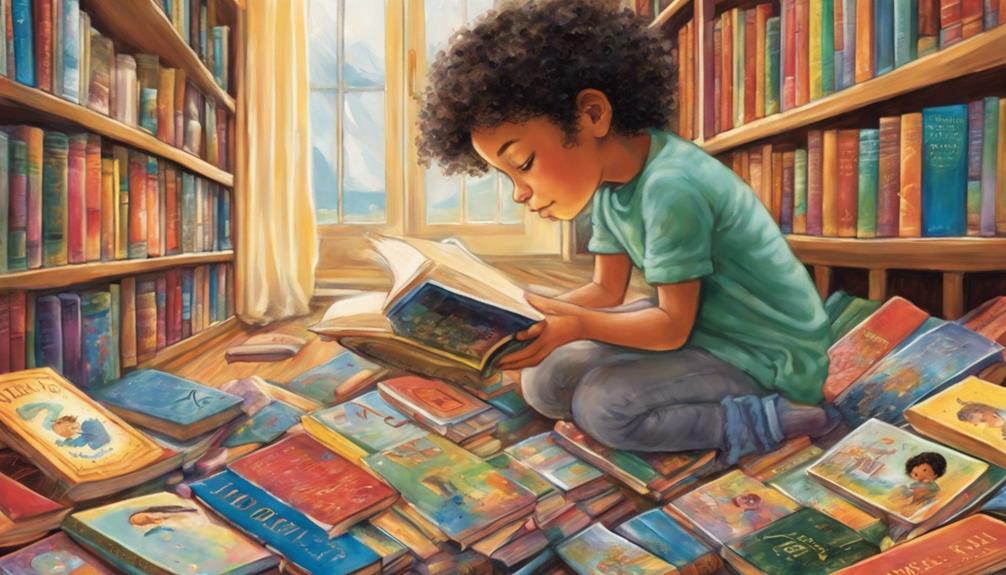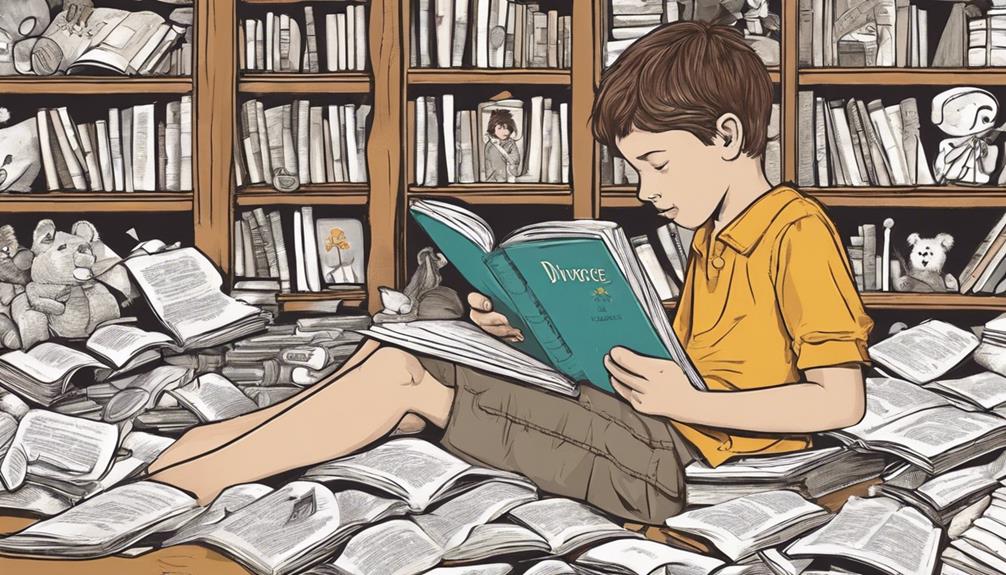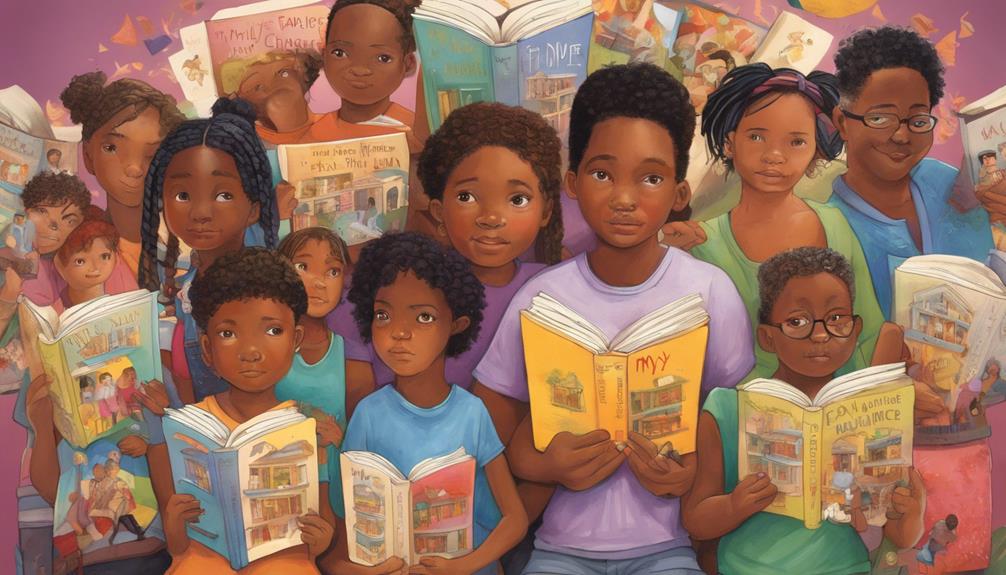Selecting the right children’s books on the topic of divorce is essential for helping kids comprehend the intricacies of family changes.
These books offer a unique way for kids to explore their feelings and find comfort during challenging times.
By providing relatable stories and fostering emotional intelligence, these resources can be invaluable for parents seeking to support their children through the ups and downs of the divorce process.
Key Takeaways
- Choose age-appropriate books with relatable characters for emotional support.
- Use storytelling to address complex emotions and foster empathy.
- Help children build resilience and understanding through diverse family narratives.
- Support your child's emotional journey by providing insights and relatable content.
Importance of Children's Books About Divorce
Exploring the significance of children's books about divorce reveals their essential role in guiding young minds through the complexities of family changes and emotions. Books on divorce serve as companions for children, helping them navigate the turbulent waters of parental separation. These stories not only provide comfort but also offer valuable insights into understanding and processing the multitude of emotions that come with such transitions. Through relatable characters and engaging narratives, these books help children understand that they aren't alone in their experiences.
Parents play a crucial role in introducing these books to their children. By reading these stories together, parents can initiate important conversations about divorce, emotions, and coping mechanisms. Good stories about divorce not only entertain but also educate, instilling empathy and emotional intelligence in children. Ultimately, children's books about divorce serve as powerful tools in fostering resilience and promoting mental well-being during challenging times.
Choosing the Right Book for Your Child

As parents facing the challenges of helping our children navigate divorce, it's crucial to carefully select a children's book that resonates with our child's age, emotions, and unique family dynamics. When choosing the right book for your child, consider the following:
- Age-Appropriate Explanations: Look for books that provide clear and simple explanations about divorce that are suitable for your child's age group.
- Relatable Characters: Seek out books with characters that your child can connect with and see themselves in, making the story more engaging and relatable.
- Emotional Maturity: Consider the emotional maturity of your child and choose a book that addresses divorce in a way that they can understand and process.
- Family in Their Titles: Books with 'family' in their titles often focus on themes of family dynamics, making them potentially helpful in discussions about divorce.
- Professional Recommendations: Don't hesitate to ask for recommendations from professionals like educators or counselors who can point you towards books that best suit your child's needs.
Addressing Emotions Through Storytelling
Children's books about divorce serve as a powerful tool for helping young readers navigate complex emotions and situations in a relatable and understandable manner. Through storytelling, children can explore feelings of confusion, fear, and sadness, finding comfort and guidance within engaging narratives.
The characters in these books often model resilience, empathy, and coping strategies, offering valuable lessons to children experiencing similar emotions. Illustrations play a crucial role in conveying these emotions effectively, enhancing the storytelling experience and helping children connect deeply with the content.
Building Resilience and Understanding

In understanding the complexities of divorce, children's books play a crucial role in nurturing resilience and fostering emotional intelligence.
- Children's books provide a safe space for exploring emotions and processing changes related to divorce.
- Through literature, kids can develop empathy towards others experiencing similar family transitions.
- Diverse representation in children's books reflects various family structures, promoting resilience and understanding.
- Reading about divorce in a relatable and age-appropriate manner helps children realize they aren't alone in their feelings.
- Literature equips children with coping skills to navigate the impacts of divorce positively, encouraging adaptability and emotional growth.
Supporting Your Child's Emotional Journey
Navigating your child's emotional journey through divorce can be aided by the insightful narratives found in children's books on the topic. These books delve into the complexities of parents' separation in a way that children can comprehend, offering relatable characters and storylines that resonate with their experiences.
The illustrations in children's books play a vital role in conveying emotions effectively, helping young readers process and understand their feelings during this challenging time.
Frequently Asked Questions
At What Age Is a Child Most Affected by Divorce?
We believe children between 6 and 8 are often most affected by divorce, grappling with guilt, blame, and confusion. Research suggests this age group may struggle with behavior changes and academic performance post-divorce. Support is crucial.
How Do You Help a Child Whose Parents Are Divorcing?
We help children whose parents are divorcing by providing reassurance, love, and open communication. We maintain stability, explain simply, and ensure the child knows it's not their fault. Together, we guide them towards resilience.
How Can I Help My Grown Child Through Divorce?
We can offer emotional support, encourage counseling, respect boundaries, help with legal matters, and promote self-care for our grown child going through divorce. Our presence and understanding can make a significant difference in their journey.
What Not to Say to Kids During Divorce?
During divorce, we should avoid saying hurtful things to kids. Let's not blame or involve them in adult matters. Instead, let's reassure them, listen to their feelings, and provide love and stability through this tough time.
Conclusion
As we close the chapter on selecting children's books about divorce, we find ourselves reflecting on the power of storytelling to guide our little ones through challenging times.
Just like characters in a book finding strength and resilience, may your child also navigate this journey with courage and understanding.
Remember, these stories are more than just words on a page – they're beacons of hope and comfort, guiding us through the ups and downs of life's unpredictable narrative.










